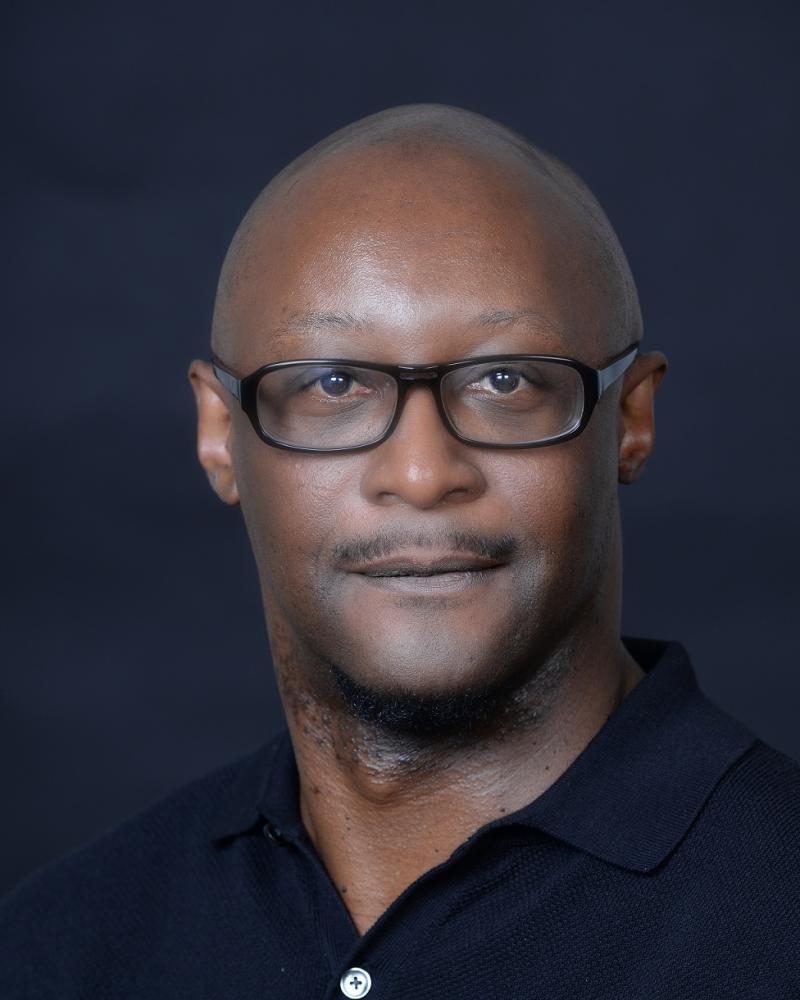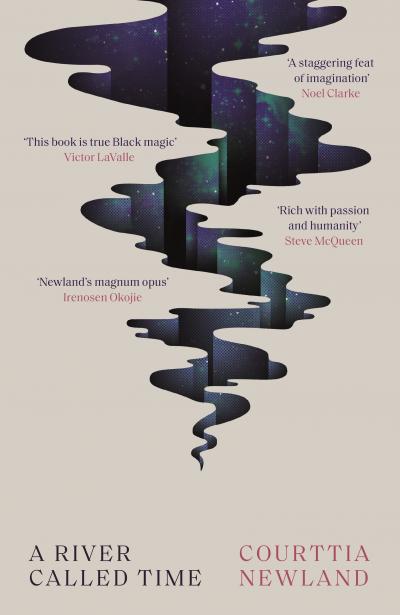Courttia Newland: A River Called Time review - an ethereality check | reviews, news & interviews
Courttia Newland: A River Called Time review - an ethereality check
Courttia Newland: A River Called Time review - an ethereality check
Picturing a world without the legacies of colonialism and slavery

It is near impossible to imagine what the world would look like today if slavery and colonialism had never existed, let alone to write a book on the subject. Courttia Newland sets himself this daunting task in his latest novel, A River Called Time.
The novel follows the life – and lives – of Markriss Denny, set against a backdrop of shifting realities and physical and ethereal planes. At its geographical and narrative centre is the Ark, a fully enclosed city-within-a-city that represents an intangible ideal to those unfortunate enough to live outside it. Their misfortune, however, is paralleled on the inside. The Ark is not the heady paradise imagined by some; it is the world of inequality, violence and deception suffered by many. The lasting impact of colonialism might not be felt, and African cosmology might well provide the dominant religion, but humanity has still found a way to perpetuate injustice. Markriss’ narratives traverse the vertical levels of society and simultaneously the levels of reality, where to conceive of astral planes and lived realities beyond the immediate physical setting is no less normal than a daily commute to work.
 It would be a disservice, however, to brand this novel pure fantasy. The cultural setting is the product not of the vagaries of novelistic imagination but of meticulous research into such subjects as Kemitan cosmology and indigenous belief systems. If, early in the novel, to wish someone "Raspeed" seems an entertaining novelty, by the latter stages it is no stranger than its equivalent Christianised idiom. The curious combination of naturalistic and mystical styles, too, overcomes its initial peculiarity to evoke the quasi-dystopian society of the Ark.
It would be a disservice, however, to brand this novel pure fantasy. The cultural setting is the product not of the vagaries of novelistic imagination but of meticulous research into such subjects as Kemitan cosmology and indigenous belief systems. If, early in the novel, to wish someone "Raspeed" seems an entertaining novelty, by the latter stages it is no stranger than its equivalent Christianised idiom. The curious combination of naturalistic and mystical styles, too, overcomes its initial peculiarity to evoke the quasi-dystopian society of the Ark.
The strangeness of this imagined world, moreover, moves the reader to consider the strangeness of their own, a mark of high-quality speculative fiction. Certainly, some phrases jut out in their direct pertinence to the reader’s reality: the Ark is "no more than a single conglomerate company", for instance, creating an elitist world where "it’s almost as if they took all the opportunity with them". But it is in fact the oddest parts of A River Called Time that come closest to envisaging a recognisable reality. An artificial climate where daylight, or "Day-Lite", is controlled, and upon whose "counterfeit ground" its inhabitants walk, is part-Truman Show, part-modern metropolis. An impenetrable city governing by means of mass surveillance and misinformation looks backwards to Nineteen Eighty-Four at the same time as casting a sly glance sideways to the travails of our times.
In short, much of the novel is less an imagined reality than a conditional one: a status quo that could well exist, had major historical events panned out differently. The achievement of Newland is to convey this reality so convincingly.
Reality, however, is itself no simple term for A River Called Time. Newland tasks himself and his reader with picturing a multiverse of existences sitting side by side. More than once, the novel explores a new plane (whether physical or astral), almost a new world that the reader must seek to comprehend all over again. If, at times, this can frustrate – the trickle-down narrative style flatly refuses to lay bare the facts until the reader has done the work themselves – it serves to maintain an intriguing sense of mystery. It equally makes for an enjoyable irony in phrases such as "a zone that could easily have been theirs if they had been other people, who lived other lives". Alternate realities pile upon alternate realities.
The latter stages of the novel offer revelations on almost every page. Readers of fantasy are familiar with its ability to form metaphors for real life experiences, but not many books endow this endless referentiality with the same urgency as A River Called Time. On the one hand, there are questions of literary creation: does fiction create alternate realities, or does it result from them? Is a society that is more recognisable than another necessarily more "real"? On another, the decolonising narrative impulse is thrown into stark relief, where the reader is moved to consider that other reality which happens to be their own, one in which the legacies of colonialism and the slave trade are all too tangibly felt.
The lasting value of A River Called Time is that it shows us the literary, cultural and historical import not only of the story but also the "making of" that story. The fabric of Newland’s construction becomes ever more visible as the story approaches its close, akin to that creation of Dr Frankenstein whose "skin scarcely covered the work of muscles and arteries beneath". The reader is shown the journey from truth to fiction and back again, in a work that could take a single step sideways and emerge into our times.
- A River Called Time by Courttia Newland (Canongate, £16.99)
- Read more book reviews on theartsdesk
rating
Explore topics
Share this article
The future of Arts Journalism
You can stop theartsdesk.com closing!
We urgently need financing to survive. Our fundraising drive has thus far raised £49,000 but we need to reach £100,000 or we will be forced to close. Please contribute here: https://gofund.me/c3f6033d
And if you can forward this information to anyone who might assist, we’d be grateful.

Subscribe to theartsdesk.com
Thank you for continuing to read our work on theartsdesk.com. For unlimited access to every article in its entirety, including our archive of more than 15,000 pieces, we're asking for £5 per month or £40 per year. We feel it's a very good deal, and hope you do too.
To take a subscription now simply click here.
And if you're looking for that extra gift for a friend or family member, why not treat them to a theartsdesk.com gift subscription?
more Books
 'We are bowled over!' Thank you for your messages of love and support
Much-appreciated words of commendation from readers and the cultural community
'We are bowled over!' Thank you for your messages of love and support
Much-appreciated words of commendation from readers and the cultural community
 Frances Wilson: Electric Spark - The Enigma of Muriel Spark review - the matter of fact
Frances Wilson employs her full artistic power to keep pace with Spark’s fantastic and fugitive life
Frances Wilson: Electric Spark - The Enigma of Muriel Spark review - the matter of fact
Frances Wilson employs her full artistic power to keep pace with Spark’s fantastic and fugitive life
 Elizabeth Alker: Everything We Do is Music review - Prokofiev goes pop
A compelling journey into a surprising musical kinship
Elizabeth Alker: Everything We Do is Music review - Prokofiev goes pop
A compelling journey into a surprising musical kinship
 Natalia Ginzburg: The City and the House review - a dying art
Dick Davis renders this analogue love-letter in polyphonic English
Natalia Ginzburg: The City and the House review - a dying art
Dick Davis renders this analogue love-letter in polyphonic English
 Tom Raworth: Cancer review - truthfulness
A 'lost' book reconfirms Raworth’s legacy as one of the great lyric poets
Tom Raworth: Cancer review - truthfulness
A 'lost' book reconfirms Raworth’s legacy as one of the great lyric poets
 Ian Leslie: John and Paul - A Love Story in Songs review - help!
Ian Leslie loses himself in amateur psychology, and fatally misreads The Beatles
Ian Leslie: John and Paul - A Love Story in Songs review - help!
Ian Leslie loses himself in amateur psychology, and fatally misreads The Beatles
 Samuel Arbesman: The Magic of Code review - the spark ages
A wide-eyed take on our digital world can’t quite dispel the dangers
Samuel Arbesman: The Magic of Code review - the spark ages
A wide-eyed take on our digital world can’t quite dispel the dangers
 Zsuzsanna Gahse: Mountainish review - seeking refuge
Notes on danger and dialogue in the shadow of the Swiss Alps
Zsuzsanna Gahse: Mountainish review - seeking refuge
Notes on danger and dialogue in the shadow of the Swiss Alps
 Patrick McGilligan: Woody Allen - A Travesty of a Mockery of a Sham review - New York stories
Fair-minded Woody Allen biography covers all bases
Patrick McGilligan: Woody Allen - A Travesty of a Mockery of a Sham review - New York stories
Fair-minded Woody Allen biography covers all bases
 Howard Amos: Russia Starts Here review - East meets West, via the Pskov region
A journalist looks beyond borders in this searching account of the Russian mind
Howard Amos: Russia Starts Here review - East meets West, via the Pskov region
A journalist looks beyond borders in this searching account of the Russian mind
 Henry Gee: The Decline and Fall of the Human Empire - Why Our Species is on the Edge of Extinction review - survival instincts
A science writer looks to the stars for a way to dodge our impending doom
Henry Gee: The Decline and Fall of the Human Empire - Why Our Species is on the Edge of Extinction review - survival instincts
A science writer looks to the stars for a way to dodge our impending doom
 Jonathan Buckley: One Boat review - a shore thing
Buckley’s 13th novel is a powerful reflection on intimacy and grief
Jonathan Buckley: One Boat review - a shore thing
Buckley’s 13th novel is a powerful reflection on intimacy and grief

Add comment